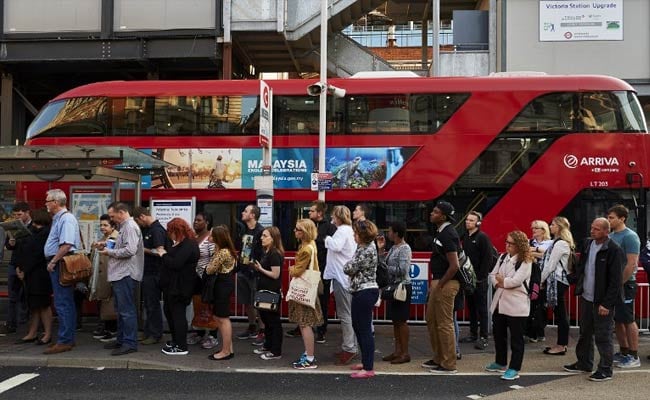
Early morning commuters form queues to board buses at Victoria station during a tube strike in London on July 9, 2015. (AFP Photo)
London:
Londoners have described scenes of "absolute carnage" as the biggest strike on the London Underground for 13 years caused severe disruption to their morning commute.
Commuters faced lengthy and difficult trips to work on Thursday after the 24-hour industrial action, which began at 6.30pm on Wednesday, forced the entire tube network to close for the first time since 2002.
Some rail and bus services were reported to be full before 6am, and most cabs were booked up from Wednesday night. Some commuters walked to work in bright sunshine.
One traveller said police had been called to a bus stop after the driver refused to move the bus because it was too full. Writing on Twitter , the commuter said: "Absolute carnage on the 113 bus. Driver refuses to drive as bus is too packed! Police called and they just arrived! #tubestrike."
Another woman said she left home two hours earlier than usual and would have to take six buses and an Overground train to get to work on time.
A spokesman from the Metropolitan police said the authorities should factor disruption into their policing.
Images of chaotic scenes outside underground stations, including Oxford Circus and Victoria began emerging on Wednesday night.
The tube handles up to 4m journeys each day, and at peak times there are more than 535 trains in operation, according to London Underground.
The strike by four unions, representing almost 20,000 staff including train drivers, is the result of a continuing dispute over pay and rosters for the all-night tube services at weekends planned to start in September. Unions said further strikes would follow this summer unless London Underground improved its offer.
Talks broke down on Tuesday evening between tube managers and the unions, with both sides denouncing the other's negotiating tactics.
The RMT general secretary, Mick Cash, said: "Despite strenuous efforts by union negotiators to press London Underground to address the issues of fairness, safety, work/life balance and equality at the heart of this dispute, they have come up with nothing in the talks."
Finn Brennan, Aslef's organiser on the tube, said: "The responsibility for this strike and the disruption that it will cause rests squarely with London Underground management.
"They squandered the window of opportunity to resolve this dispute by refusing to move their position in the slightest for three months and then demanding that all four trade unions accept an offer in one afternoon.
"We will be ready to return to the negotiating table on Friday morning to ensure that further action can be avoided."
The transport secretary, Patrick McLoughlin, called the strike unnecessary and said it threatened massive disruption and benefited no one. "We stand shoulder-to-shoulder with workers, families and commuters who want to go about their lives without disruption. I urge the strikers to accept the good offer that employers have made and get back to work," he said.
Commuters faced lengthy and difficult trips to work on Thursday after the 24-hour industrial action, which began at 6.30pm on Wednesday, forced the entire tube network to close for the first time since 2002.
Some rail and bus services were reported to be full before 6am, and most cabs were booked up from Wednesday night. Some commuters walked to work in bright sunshine.
One traveller said police had been called to a bus stop after the driver refused to move the bus because it was too full. Writing on Twitter , the commuter said: "Absolute carnage on the 113 bus. Driver refuses to drive as bus is too packed! Police called and they just arrived! #tubestrike."
Another woman said she left home two hours earlier than usual and would have to take six buses and an Overground train to get to work on time.
A spokesman from the Metropolitan police said the authorities should factor disruption into their policing.
Images of chaotic scenes outside underground stations, including Oxford Circus and Victoria began emerging on Wednesday night.
The tube handles up to 4m journeys each day, and at peak times there are more than 535 trains in operation, according to London Underground.
The strike by four unions, representing almost 20,000 staff including train drivers, is the result of a continuing dispute over pay and rosters for the all-night tube services at weekends planned to start in September. Unions said further strikes would follow this summer unless London Underground improved its offer.
Talks broke down on Tuesday evening between tube managers and the unions, with both sides denouncing the other's negotiating tactics.
The RMT general secretary, Mick Cash, said: "Despite strenuous efforts by union negotiators to press London Underground to address the issues of fairness, safety, work/life balance and equality at the heart of this dispute, they have come up with nothing in the talks."
Finn Brennan, Aslef's organiser on the tube, said: "The responsibility for this strike and the disruption that it will cause rests squarely with London Underground management.
"They squandered the window of opportunity to resolve this dispute by refusing to move their position in the slightest for three months and then demanding that all four trade unions accept an offer in one afternoon.
"We will be ready to return to the negotiating table on Friday morning to ensure that further action can be avoided."
The transport secretary, Patrick McLoughlin, called the strike unnecessary and said it threatened massive disruption and benefited no one. "We stand shoulder-to-shoulder with workers, families and commuters who want to go about their lives without disruption. I urge the strikers to accept the good offer that employers have made and get back to work," he said.
Track Latest News Live on NDTV.com and get news updates from India and around the world

